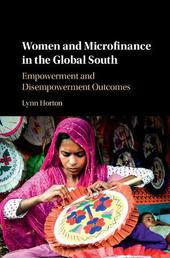
|
Women and Microfinance in the Global South: Empowerment and Disempowerment Outcomes
Hardback
Main Details
| Title |
Women and Microfinance in the Global South: Empowerment and Disempowerment Outcomes
|
| Authors and Contributors |
By (author) Lynn Horton
|
| Physical Properties |
| Format:Hardback | | Pages:258 | | Dimensions(mm): Height 235,Width 156 |
|
| Category/Genre | Development economics |
|---|
| ISBN/Barcode |
9781108418720
|
| Classifications | Dewey:332.2 |
|---|
| Audience | | Professional & Vocational | |
|---|
| Illustrations |
Worked examples or Exercises; 8 Tables, black and white; 3 Line drawings, black and white
|
|
Publishing Details |
| Publisher |
Cambridge University Press
|
| Imprint |
Cambridge University Press
|
| Publication Date |
28 December 2017 |
| Publication Country |
United Kingdom
|
Description
Originally conceived as small-scale loans allowing impoverished women to invest in informal sector economic opportunities, microfinance programs have grown rapidly across the globe over the past two decades to become the most common development tool used to empower women in low- and middle-income countries. Women and Microfinance in the Global South incorporates a meta-synthesis of thirty qualitative empirical cases from Asia, Africa, and Latin America to explore the links between microfinance and women's empowerment, questioning how microfinance facilitates the economic and socio-political empowerment of women. The theoretical framework assesses both positive and negative outcomes of microfinance at the grassroots level, considering how such market-based interventions intersect with patriarchal beliefs and practices, and analyses the different mechanisms through which microfinance can empower or disempower women. It will interest scholars of developmental studies and women's issues, as well as practitioners, NGOs, and policymakers.
Author Biography
Lynn Horton is Associate Professor of Sociology at Chapman University, California. She has worked for non-governmental organisations on issues of human rights, sustainable development, gender equality, and the environment.
Reviews'This engagingly written book analyses qualitative research from fifteen countries to debunk some of the myths surrounding microcredit and in so doing both draws on and contributes to critical feminist scholarship on microfinance. Lynn Horton offers some clear-eyed policy recommendations for better designed programmes. This book is a must-read for those specialising in development issues whether course leaders, researchers, or policymakers and practitioners.' Maxine Molyneux, University College London 'This is one of the most comprehensive, incisive and insightful accounts of the evidence on microfinance and women's empowerment that I have come across. It is beautifully written, clear and wide-ranging. It deserves to be widely read.' Andrea Cornwall, University of Sussex 'This quite exhaustively researched, and incredibly well-nuanced and measured book, provides an eminently topical and critical resource for discerning stakeholders of the capacity of microfinance scheme for women to alleviate poverty, to promote female 'empowerment', and to advance gender equality in our new, and increasingly neoliberalised, global age. Drawing on rigorous analysis of an impressively wide range of qualitative and quantitative case studies from Latin America, Africa and Asia, accompanied by impeccable up-to-date referencing, Lynn Horton offers provocative insights and suggestions which are crucial to Agenda 2030, and which should be urgently heeded by scholars and policymakers alike. This refreshingly well-written and accessible text will be a 'must-read' for staff and students engaged in development and gender and development courses across the globe, as well as for those at the frontline of policy and praxis.' Sylvia Chant, London School of Economics and Political Science 'Women and Microfinance in the Global South constitutes an invaluable aid to students, researchers, and practitioners alike, and it will be very interesting to watch what impact this book will have on development research, and the validity and importance which is accorded to qualitative academic work in policy circles.' Kate Maclean, Gender & Development
|